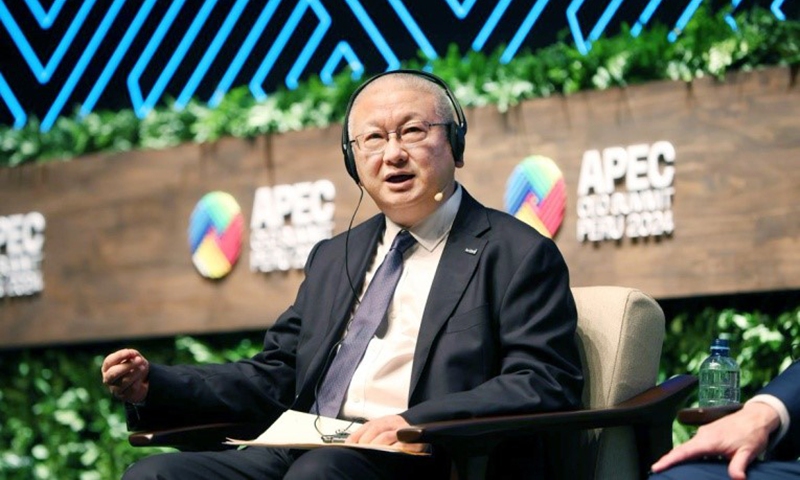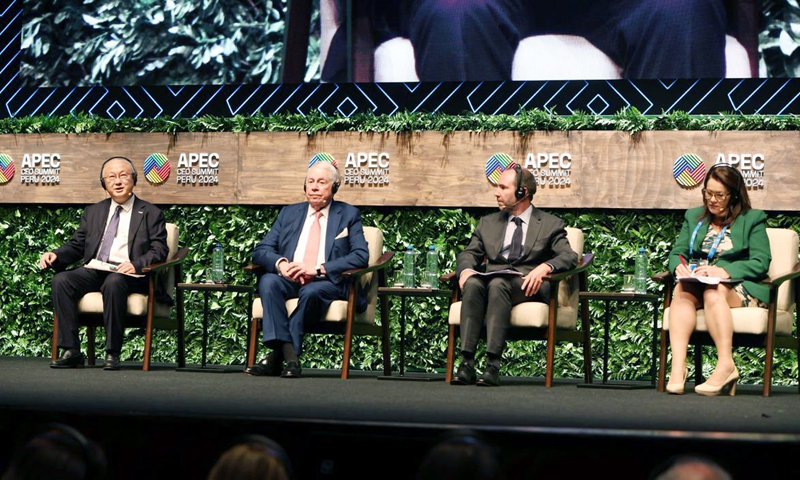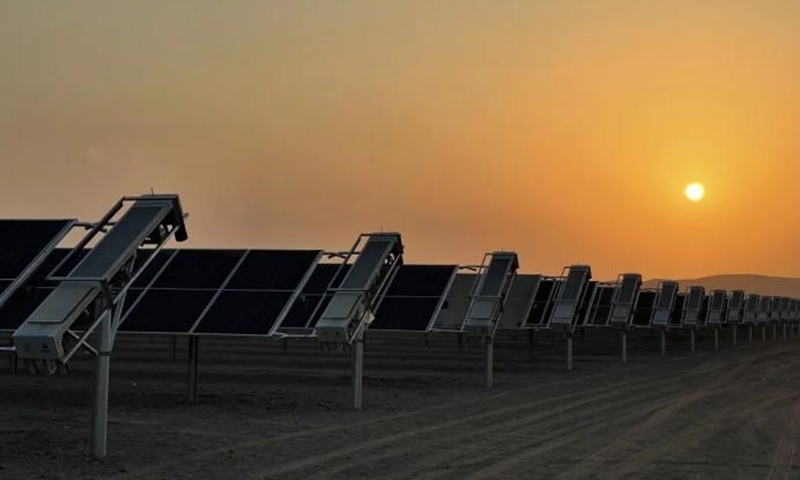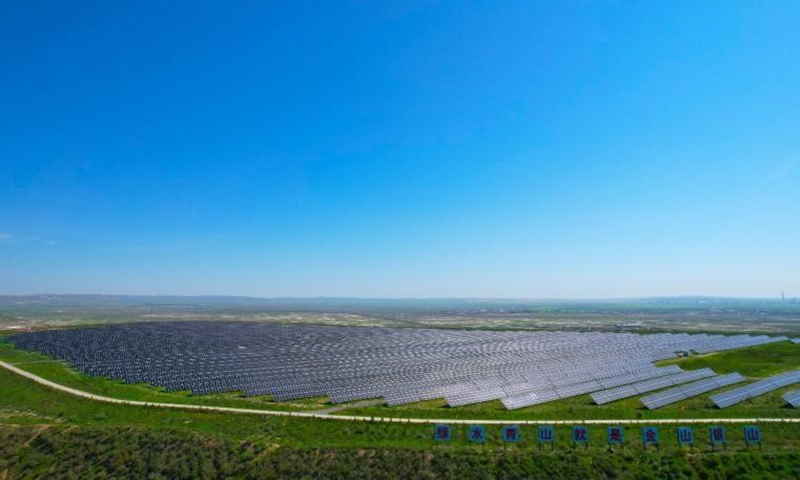From November 13th to 15th, the 2024 Asia-Pacific Economic Cooperation (APEC) Business Leaders Summit was held in Lima, the capital of Peru.
As the only corporate representative of China's photovoltaic industry, Li Zhenguo, founder and president of LONGi Green Energy, attended the summit and conducted in-depth discussions on topics such as energy transition and mining decarbonization with Richard Adkerson, chairman of copper mine development company Freeport-McMoRan, and Juan Andrés Errázuriz , chief executive of blasting service solution company Enaex on November 14.

Li Zhenguo, founder and president of LONGi Green Energy, attends the 2024 Asia-Pacific Economic Cooperation (APEC) Business Leaders Summit, which was held in Lima, capital of Peru on November 13-15.
It is the highest-level summit for leaders of APEC economies to discuss important affairs in the Asia-Pacific and promote trade liberalization and economic cooperation. Since it was first held in 1997, it has become an important link and platform for exchanges between the political and business circles in the Asia-Pacific region. This time, the APEC Business Leaders' Summit focused on the theme of "People, Business, Prosperity", which fully reflects APEC's vision of advancing economic cooperation among member economies, promoting economic growth, and achieving common prosperity.
Speeding up global energy transformationIn order to cope with the challenge of global climate change, more than 150 countries around the world have proposed "carbon neutrality" goals. To achieve "carbon neutrality", energy is the main battlefield and electricity is the main force.
Photovoltaic is the "amplifier" and "porter" of clean energy. The production of each watt of photovoltaic modules consumes approximately 0.4 kilowatt-hours of electricity. During its entire life cycle, it can generate approximately 45 kilowatt-hours of green electricity. The energy output is more than 100 times the consumption. With the further advancement of the global "carbon neutrality" goal, clean energy represented by photovoltaics has gradually become the backbone of global energy transformation.
This is due to advances in photovoltaic technology driving conversion efficiency improvements and cost reductions. In the past decade or so, photovoltaic technology has advanced and cost reduced beyond imagination, Li said. Photovoltaics have developed into the most economical power energy in most countries and regions around the world, supporting the global energy transformation and carbon neutrality process.
"We are very proud of this" he said.

Li Zhenguo (first from left), founder and president of LONGi Green Energy, attends the 2024 Asia-Pacific Economic Cooperation (APEC) Business Leaders Summit, which was held in Lima, capital of Peru on November 13-15.
Twenty years ago, the electricity price in Germany was 60 euro cents/kWh, and the photovoltaic photoelectric conversion efficiency was 13% to 14%. In 2013, the cost of photovoltaic power generation in Europe was 9 euro cents per degree, which was consistent with the cost of natural gas power generation, achieving grid parity. The photovoltaic photoelectric conversion efficiency was 17% to 18%. Today, the cost of photovoltaic power generation in Europe is about 3 euro cents/degree, while in the Middle East it has dropped to 1 to 1.5 cents/degree, and the conversion efficiency of photovoltaic power generation is about 25%, Li noted.
At present, the global photovoltaic industry chain is mainly distributed in China, and the energy consumption and carbon emissions in the production process occur in China. China has made great contributions to global energy transformation and sustainable development.

A 406 MW photovoltaic project in Red Sea New City, Saudi Arabia, with module products provided by LONGi.
As the world's leading solar technology company, LONGi has always focused on improving the conversion efficiency of solar cells and has always promoted the cost reduction and efficiency increase of the entire photovoltaic industry through the industrialization of advanced technologies. Currently, LONGi is the "double champion" of world battery efficiency records in two major circuits: crystalline silicon single-junction cells (27.30%) and crystalline silicon-perovskite stacked cells (34.6%).
At present, with the continuous improvement of photovoltaic technology, the cost of photovoltaic power generation continues to decrease. "We believe that in 5 to 8 years, photovoltaic technology with a conversion efficiency of more than 30% will be mass-produced. By then, in some areas with good lighting conditions, the cost of photovoltaic power generation should be less than 1 cents/degree. This is technically feasible, and the cost of producing green hydrogen by electrolyzing water with green electricity is also in the process of falling," Li said.
In addition, Li said that artificial intelligence will affect many aspects of photovoltaics, including the speed, efficiency, production efficiency, quality management, etc. of photovoltaic technology research and development.
"It will enable new energy, especially photovoltaic production, to achieve more rapid technological iteration, including cost reduction" he explained.
Green development of mining industryMining is a high-energy-consuming industry, and promoting green and low-carbon development of the mining industry is an inevitable choice.
"It is very important for the green and sustainable development of the mining industry,"Li said.
"In producing battery components, we use copper, so we pay close attention to whether green and low-carbon practices are applied during copper mining and smelting. Decarbonizing these processes reduces the carbon footprint of photovoltaic modules, making them more environmentally friendly."
In order to achieve green and sustainable development in the mining industry, the use of photovoltaic power generation presents a "triple-win" solution.
Photovoltaic power generation allows mining to use green electricity. Mining areas have a large demand for electricity, and power supply is one of the main problems faced by developing mining areas, especially remote ones. Currently, diesel generators are commonly used, resulting in high carbon emissions and high costs.
"We can completely build a mini-grid for mines through photovoltaic power generation and energy storage. On the one hand, this allows the mines to use clean electricity, and on the other hand, it significantly reduces electricity costs," Li said.
During the mining process, explosives are used and their production requires the use of ammonia, which is currently produced from coal, resulting in high carbon emissions. By harnessing green electricity from photovoltaics to produce green hydrogen, which can then be converted into green ammonia, the industry can manufacture green explosives. This innovation offers a viable pathway to reduce emissions in mining operations.

The optical storage power station at the Shengli Energy open-air dump site of China Energy Group, jointly built by LONGi and China Energy Group, uses LONGi components to restore the local ecology.
Photovoltaics also play a key role in rehabilitating abandoned mines. With the continuous exploitation and use of mining resources, the number of depleted mines is on the rise. During rainy weather, these sites often accumulate and may cause pollution to the surrounding areas. The combination of photovoltaic power generation and mine management addresses multiple challenges: It ensures the effective use of land resources, produces green electricity, diverts rainwater, and protects the environment. This approach holds significant promise for ecological environment management and energy transformation, and further promotes the green and low-carbon mining industry transformation.
Achieving global energy transformation requires the cooperation of all countries and enterprises around the world. As a leading photovoltaic company, LONGi will continue to promote the large-scale application and popularization of clean energy around the world and further contribute to global energy transformation.







